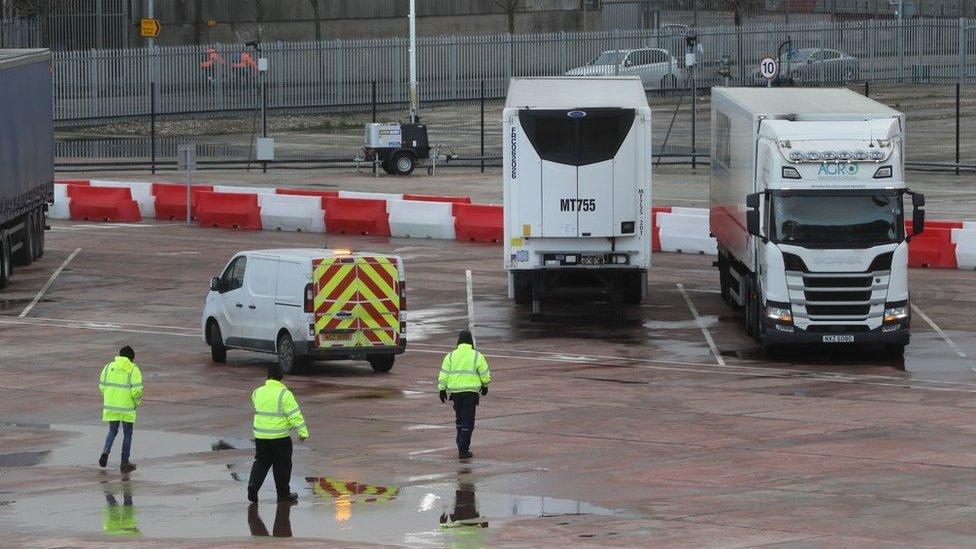Brexit: DUP urges PM to 'be the unionist we need'
- Published
"Be the unionist we need you to be" - PM is told by DUP's Ian Paisley during PMQs
A DUP MP has called on the prime minister to "be the unionist we need him to be" in addressing concerns over the Irish Sea border.
Ian Paisley told the Commons that the Brexit agreement had betrayed unionists and made them "feel like foreigners in our own country".
Meanwhile a "cordial" meeting between the UK government, EU and NI's first and deputy first ministers has ended.
There will be further discussions next week.
Cabinet Office Minister Michael Gove and European Commission Vice-President Maroš Šefčovič said they would "work intensively to find solutions to outstanding issues".
Speaking before that meeting took place, Mr Paisley said "tea and sympathy would not cut the mustard" and urged Downing Street to act.
Boris Johnson said the government would "do everything we need to do".
Unionists oppose the part of the Brexit deal known as the Northern Ireland Protocol, arguing it damages trade and threatens UK unity.
Northern Ireland's First Minister Arlene Foster, who leads the Democratic Unionist Party, has announced plans to stop north-south activities related to the NI Protocol until action is taken to address what she called a "growing crisis" over the Irish Sea border.
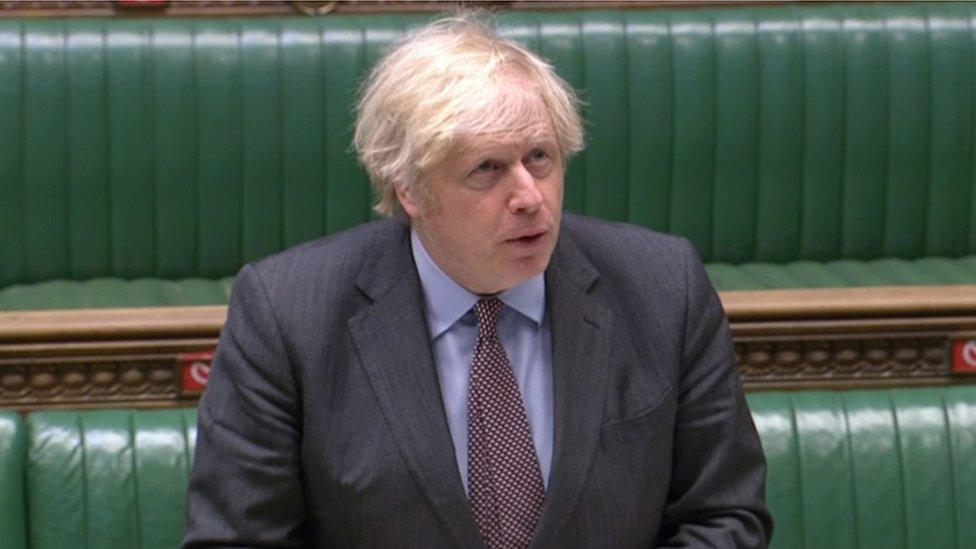
Prime Minister Boris Johnson has said his commitment to the union is 'unshakeable'
Responding to Mr Paisley in the Commons, the prime minister insisted he was committed to Northern Ireland and the union.
He said the government would act "legislatively" or by invoking an emergency mechanism known as Article 16 to override part of the protocol, external, if other solutions cannot be reached with the EU to remove GB-NI trade barriers.
What is the UK asking for?
The UK has already written the EU, external asking for agreement to a long extension of grace periods for the Irish Sea border.
Currently, supermarkets and other businesses are being allowed to operate with reduced requirements for paperwork and certification when moving goods from Great Britain to Northern Ireland.
The first of those grace periods is due to expire in April, but in a letter to the EU the UK government has asked for an extension until 2023.
It has also requested the creation of a common travel area for pets which would reduce the new post-Brexit processes for moving pets across the Irish Sea.
UK and EU leaders held talks to try to resolve the trade issues between Great Britain and Northern Ireland.
What have political parties said?
Mrs Foster spoke to Mr Johnson ahead of the UK-EU meeting, which she took part in along with Deputy First Minister Michelle O'Neill, Mr Gove and Mr Šefčovič.
Following the meeting, the first minister said the UK government accepted problems with trade between GB and NI following Brexit were "more than just teething problems", however, she added: "I'm not so sure that's the case in the European Commission."
"I have to say I was disappointed with some of the statements made by Maros Sefcovic in relation to teething problems [relating] to the rigorous implementation of the protocol because of course that's not going to cut it," she said.
"I think everybody knows now that there's fundamental reform and that needs to be dealt with very, very quickly.
"We have some cliff edges coming up on 1 April and we all know that, so therefore we need to work very quickly to deal with these issues."
But Ms O'Neill welcomed the position from the European Commission.
The deputy first minister said Mr Šefčovič had "put his hands up" in the meeting over the attempt to introduce Article 16 last Friday.
Ms O'Neill said he also asked that the Commission's "track record" of political and financial support for peace in Northern Ireland was taken into account.
"I think they [European Commission] came at it with a very constructive and open mind in terms of resolution to some of the outstanding issues however they were also equally very clear that the protocol must be implemented in its entirety," she told BBC News NI.
"The EU has been very clear in saying that the protocol is not up for renegotiation - I share that view."
What have the UK government and EU said?
Mr Gove and Mr Šefčovič released a joint statement to say they would "work intensively to find solutions to outstanding issues".
The statement said the UK government and EU Commission reiterated their full commitment to the Good Friday Agreement, and to the "proper implementation" of the protocol
Both "condemned unreservedly any threats or intimidation".
Mr Šefčovič is also set to travel to London to continue talks.
On Monday night, Stormont's Department of Agriculture decided to suspend Brexit checks on animal products at some NI ports after "threats" were made against inspection staff.
However, a senior police officer said there was no evidence any of the main loyalist paramilitary groups were involved in the incidents.
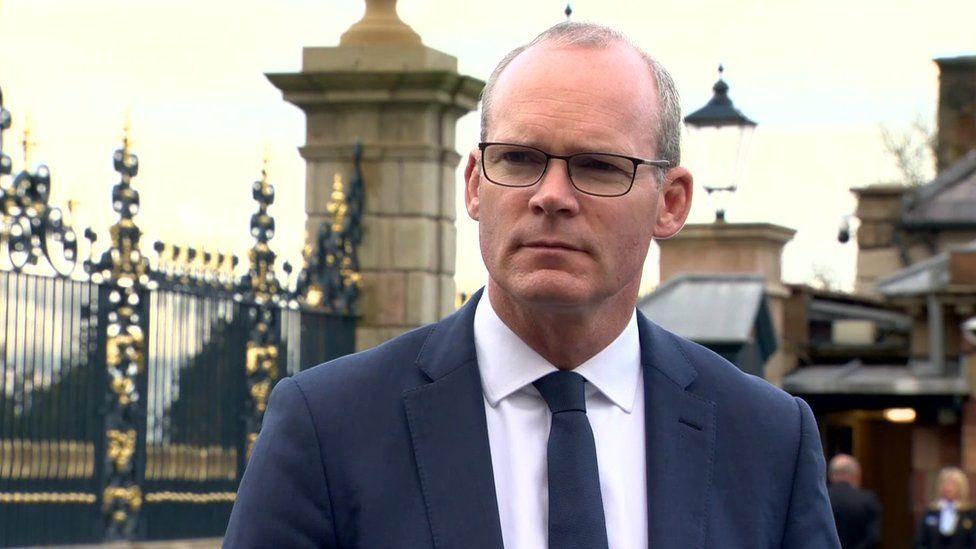
Simon Coveney said the protocol needed to be improved where possible
Speaking on Radio 4's Today programme, Irish Foreign Minister Simon Coveney said he recognised there were "serious problems" with the protocol that needed to be resolved.
But he warned it should be improved where possible, rather than scrapped as unionists have demanded.


Brussels might feel battered and bruised over its Article 16 blunder, but is it ready to bend?
That is the hope of Michael Gove and Arlene Foster as they attempt to squeeze some concessions from Maroš Šefčovič around the NI Protocol.
Asking for a two year extension for Protocol exemptions is a big demand from London and won't sit easy with Brussels.
But the DUP asking for the Protocol to be binned is a big demand which won't sit easy with London.
'Fix, not ditch'
Removing the Protocol would involve renegotiating a Withdrawal deal which took four years to put together.
Boris Johnson last night made clear his "unshakeable" commitment to securing Northern Ireland's place in the union, but he also made clear he wants to fix the protocol, not ditch it.
What we may get today is an extension of the grace period to allow businesses more time to adjust to the new rules.
That will be sold by some as the first victory in a longer battle, but for others it will be as much as the EU should bend.

SDLP leader Colum Eastwood said it was "highly regrettable that the first minister had chosen to approach the challenges presented by Brexit in a way that will increase instability and heighten tension at a time of immense sensitivity".
The Foyle MP again called for a moderation in language.
What is the NI protocol?
The NI Protocol was part of the Brexit Withdrawal Agreement and guarantees an open border between the EU and Northern Ireland, with no controls on exported products.
Instead there are checks on some products travelling from Great Britain to Northern Ireland.
This is because Northern Ireland in effect remains part of the EU single market for goods while the rest of the UK has left.
Article 16 of the protocol part of the deal allows the EU and UK to choose to suspend any aspects they consider are causing "economic, societal or environmental difficulties".
On Friday evening the EU announced it would trigger the clause and introduce the export controls on its vaccines entering Northern Ireland in a bid to prevent the region becoming a backdoor for jabs to be sent to the UK mainland.
It later reversed this decision, but unionist parties in NI have been pressing the UK government to use Article 16 to reduce checks on goods entering Northern Ireland from the rest of the UK.
- Published3 February 2021
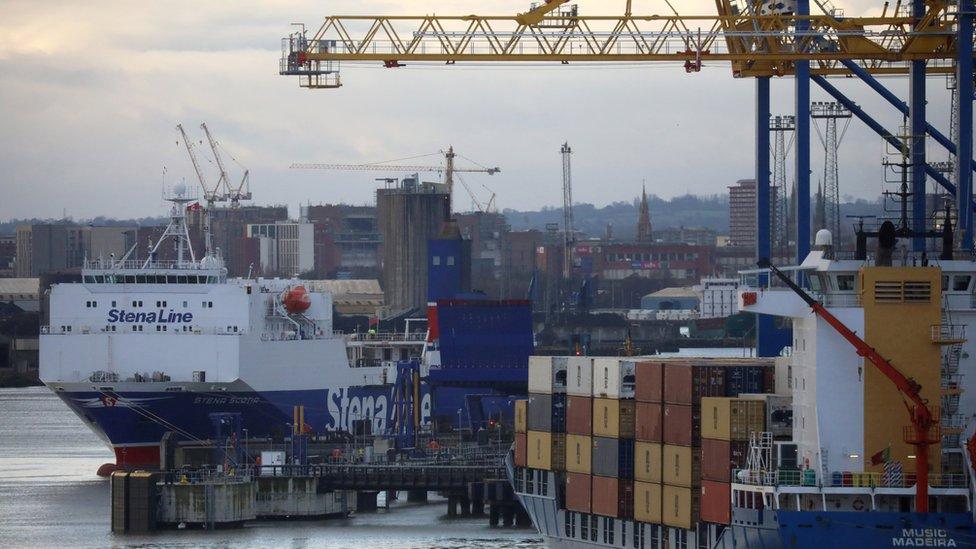
- Published2 February 2024

- Published30 January 2021
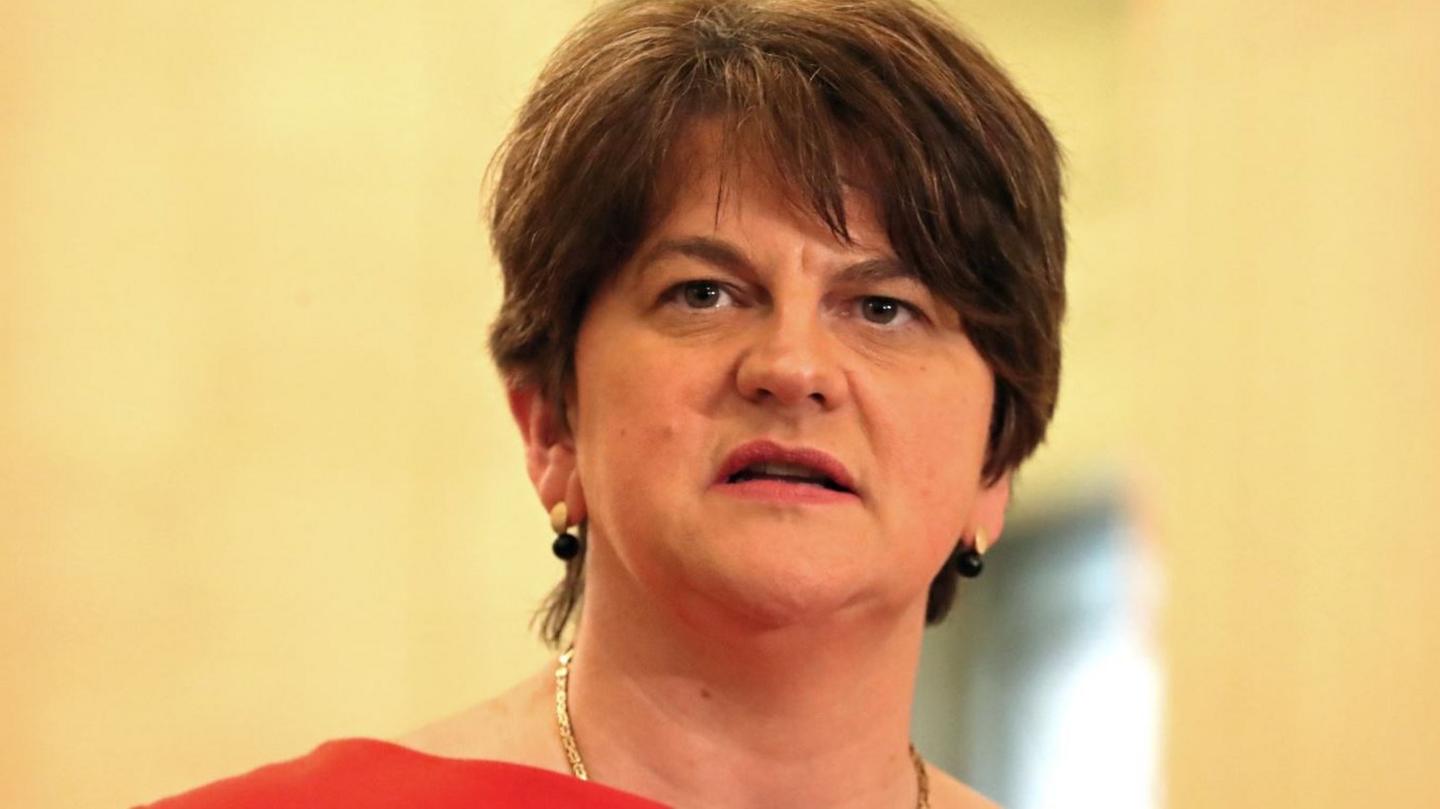
- Published26 January 2021
